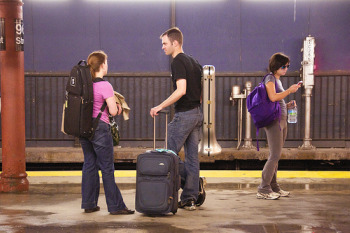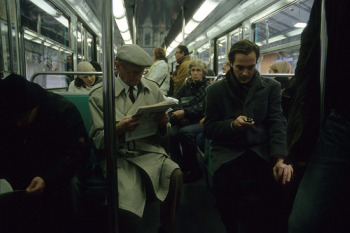One of the things you realize quickly when you start hanging around people who love to travel is that there’s a certain crowd that also likes to argue about travel. In this case, I’m not referring to the often entertaining discussions about the best beaches on which to watch a sunrise, which cities have the worst public transportation, or those “I can top that” tales of all manner of travel illnesses and mishaps.
Instead, I’m talking about the kind of arguments that pit one traveler against another, and are designed solely to make one person feel better at the expense of someone else. Freelance writer Lucy Corne said it well in a recent article on BootsnAll:
People say that travel broadens the mind, so you might expect to find a tad more tolerance between fellow travellers. Instead, I find myself constantly up against different types of travel snob, people who consider themselves superior for a wealth of bizarre reasons.
[social]
These travel arguments often divide people who have more in common then they might like to admit, and always do more harm than good. If we all agreed with travel writer Rolf Potts when he says, “the value of travel doesn’t come in comparison to other people, but in terms of how it enhances your own life in any number of ways,” then these arguments wouldn’t last. But there’s just no getting away from them, it seems.
As if you couldn’t already tell, I don’t like these arguments. And though I might personally come down on one side of each one of the stupid travel arguments listed below, you won’t hear me belittling someone else for choosing the other one.
Backpack vs. Roller Bag
 This is one of the classic traveler arguments, and if you’ve spent any time on travel message boards you’ve seen it come up – probably repeatedly. The question is whether it’s better to travel with a big backpack or with a suitcase that has wheels.
This is one of the classic traveler arguments, and if you’ve spent any time on travel message boards you’ve seen it come up – probably repeatedly. The question is whether it’s better to travel with a big backpack or with a suitcase that has wheels.
While there are advocates for both sides of this argument, I’ve only ever seen what I’d consider “evangelists” on the backpack side. They’ll tell you it’s the only way to travel, in part because you’re forced to bring less “stuff” and because you’re more mobile on public transportation or over rough terrain. People who prefer “wheelie bags” don’t tend to like having the weight of everything they’re traveling with (which, to be fair, is sometimes too much) on their backs.
The reality is that there are situations for which a backpack is better than a roller bag, and other situations where a roller bag is ideal. I’ll readily admit that it only took one trip to Venice where I had to pick up and carry my heavy roller bag up and down the steps of approximately 17,000 tiny bridges (but who’s counting?) for me to switch to a backpack on a later trip to the canal city. But there’s no way I’m going to give up the convenience of a bag with wheels for a trip like I did recently to Las Vegas, where the entire city might very well be paved.
A conversation about what we pack our stuff in should center on specific itineraries and circumstances and not on one way being inherently better than another. Because it’s not.
>> Learn how to travel very lightly
Guided Tour vs. Independent Travel
 In my experience, this one doesn’t generate the kind of heated discussions that some other arguments on this list do, because there are plenty of independent travelers who will take a guided tour of a particular city, museum, or historic site even if they’re on an otherwise unguided trip. It’s when you start talking about the differences between people who take, say, cruises or big-bus tours and those who plan their own trips from start to finish that the nonsense starts.
In my experience, this one doesn’t generate the kind of heated discussions that some other arguments on this list do, because there are plenty of independent travelers who will take a guided tour of a particular city, museum, or historic site even if they’re on an otherwise unguided trip. It’s when you start talking about the differences between people who take, say, cruises or big-bus tours and those who plan their own trips from start to finish that the nonsense starts.
It’s not uncommon to hear the people marching around behind a flag-wielding tour guide described as sheep (and to be fair, they do sometimes make themselves easy targets with their matching hats or nametags). But to suggest that people on big-bus tours or cruises are lesser travelers is idiotic. Just because someone pays for the services of a guide doesn’t make them any less interested in the places they’re going – and in fact, having a local guide around at all times could mean they’re learning more about those places than someone who’s relying entirely on their own research.
Cruises and vacation packages give people who might be (or at least think they are) too busy to plan a trip a chance to get out and see the world. They provide training wheels for those who aren’t comfortable navigating through other cultures or languages. Independent travel, on the other hand, is the only way to get that sense of accomplishment when you master the bus system in a foreign city. It can offer a more singular experience because you’re forced to interact with the locals and ask questions rather than rely on a guide.
And y’know what? They’re both perfectly fine ways to travel. If one of them doesn’t suit you, don’t do it. Besides, if taking a package tour gives someone the confidence they need to book their next trip independently, then packages are the “gateway drug” to independent travel – and I’m all for that.
>> Find out how to negotiate with a tour guide to get the experience you want
High-Tech Travel vs. Low-Tech Travel
 This argument is, for obvious reasons, a newer one among travelers. When I first started traveling, “high-tech travel” meant bringing a walkman and a few cassettes along on a trip. Now, it can mean anything from traveling with an iPod, a digital camera, an iPhone or BlackBerry, a laptop, a Kindle, or a small netbook. And each time the high-tech gets a little higher, there’s someone not ready for the move who’s still prefectly ready to condemn it.
This argument is, for obvious reasons, a newer one among travelers. When I first started traveling, “high-tech travel” meant bringing a walkman and a few cassettes along on a trip. Now, it can mean anything from traveling with an iPod, a digital camera, an iPhone or BlackBerry, a laptop, a Kindle, or a small netbook. And each time the high-tech gets a little higher, there’s someone not ready for the move who’s still prefectly ready to condemn it.
I talked a little bit about this several months ago in an article about whether people should use Twitter when they travel (a response to Rolf Potts’ article on World Hum saying people should not), but I’ll say it again – whether someone wants to use a certain piece of new-fangled technology or not shouldn’t be the issue. The issue should be whether said technology keeps you from experiencing the place you’ve paid money to visit. It’s just as easy to bury your head in a good old-fashioned book or lose hours writing in your journal as it is to go cross-eyed sending constant text updates to Twitter from your mobile phone – and in both cases, you’re living in your own bubble instead of experiencing the world around you.
The question of whether high-tech or low-tech travel is inherently better seems akin to the argument about backpacks vs. wheeled bags. In some cases, having high-tech tools at your disposal will make your trip easier, cheaper, and more fun. In other cases, those high-tech gadgets won’t help or even function, so you’d better remember how to use the low-tech ones.
Above all, it really shouldn’t matter to you what kinds of tools someone else uses (or doesn’t use) when they travel, because it doesn’t have any bearing on what tools – tech or no – you use.
>> Read about the flashpacking travel style
Tourist vs. Traveler
 This argument is by far the most common one you hear among travelers, and it also happens to be – by a magnitude of light years – the one I hate the most. I would love it very much if I never heard someone trying to draw a distinction between “tourists” and “travelers” ever again, but that ain’t gonna happen. So what am I doing instead? Throwing my two cents into the argument. Naturally.
This argument is by far the most common one you hear among travelers, and it also happens to be – by a magnitude of light years – the one I hate the most. I would love it very much if I never heard someone trying to draw a distinction between “tourists” and “travelers” ever again, but that ain’t gonna happen. So what am I doing instead? Throwing my two cents into the argument. Naturally.
There are several quotes that reference this ridiculous “distinction,” including G.K. Chesterton’s “The traveler sees what he sees. The tourist sees what he has come to see,” and Paul Theroux’s famous line, “Tourists don’t know where they’ve been, travelers don’t know where they’re going.” But I think Evelyn Waugh was being more honest when he said, “‘we’ are travelers and cosmopolitans; the tourist is the other fellow.” And Rolf Potts must have been reading my mind when he articulated my opinion on this topic:
The tourist/traveler distinction has largely degenerated into a cliquish sort of fashion dichotomy: Instead of seeking the challenges that mindful travel requires, we can simply point to a few stereotypical ‘tourists,’ make some jokes at their expense, and consider ourselves ‘travelers’ by default.
When you are in a place in which you do not live, you are a traveler – and you are a tourist. Period. Drawing a semantic difference between the two words is pointless, and since it’s usually meant to be hurtful, it would be spectacular if we could just do away with this particular judgmental argument altogether.
>> Read about the benefits of slow travel
I can’t believe I’m quoting Rodney King… Again…
 Back when I wrote about using Twitter for travel, I was kind of surprised with myself for using that Rodney King quote we all know and love (or love to hate), “Can’t we all just get along?” But as I’m writing this article, I find myself thinking the same thing.
Back when I wrote about using Twitter for travel, I was kind of surprised with myself for using that Rodney King quote we all know and love (or love to hate), “Can’t we all just get along?” But as I’m writing this article, I find myself thinking the same thing.
Travelers who evangelize one way of traveling over another are no different than so-called “Bible-beaters” who espouse one religion over another. In some cases, it may come from a good place – someone thinks he has the right answer and wants to share it. But more often it’s about one person’s inability to see how there could be more than one right answer to a question.
Furthermore, the notion that the way you travel somehow impacts the way I travel is, for the most part, silly. It should make no difference to me how you choose to travel, so long as you don’t force your way on me. The old saying about how your right to swing your fist ends where my nose begins is entirely appropriate here.
Once again, as it did in the Twitter article, it comes down to one thing – respect. I respect your right to travel your way, as long as you respect my right to travel my way. It’s that simple. Travel blogger Gary Arndt recently touched on this on his blog, where he said:
Just because someone doesn’t travel the way you like doesn’t mean you have to tell them. It is extremely tacky behavior. Just because something isn’t your cup of tea doesn’t mean you have to go on a jihad. There is no wrong way to travel.
All of the arguments I wrote about in this article have one thing in common – they’re unnecessary. Anyone who values travel – whether they define travel as a weekend trip to the beach, a cruise to the Bahamas, a road-trip across country, a summer backpacking trip through Europe, or a year-long round-the-world journey – has something in common. Not everyone may like that, but it’s true.
And all the arguing over semantics and ignoring commonalities does little to promote travel to anyone who’s on the fringes, either. If we as travelers want this to be some kind of exclusive club where only the people who agree with us get to join, we’ll keep having these arguments. If, on the other hand, we really think so highly of travel, we’ll throw open the doors and embrace all comers.
I like the second club better. You?
Read more on travel philosophy:
- Lessons from Middle Earth: How to Use a Guidebook Without Letting it Ruin Your Trip
- Rethinking Traditional Travel: 7 Tips to Break the Mold
- The Sliver of Light that Reminded Me Why I Love Travel
About the Author
BootsnAll staff writer Jessica Spiegel is the resident Italophile in the office and writes BootsnAll’s Italy Travel Guide. If you must know, she’s partial to roller bags, loves being wired when she travels, and tends to favor independent travel. But seriously, if you try to get her to pick a side on the tourist vs. traveler thing, she just might smack you.
photos, top to bottom, by: Tweek, Ed Yourdon, Ed Yourdon, diegosaldiva, wili_hybrid, karpov the wrecked train